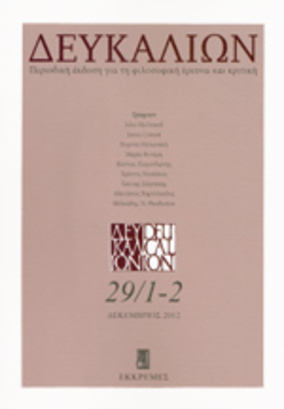Ο Αριστοτέλης για τη μεταθανάτια ευδαιμονία
Part of : Δευκαλίων : περιοδική έκδοση για τη φιλοσοφική έρευνα και κριτική ; Vol.28, No.2, 2011, pages 35-49
Issue:
Pages:
35-49
Parallel Title:
Aristotle's discussion of posthumous fortune
Author:
Abstract:
Aristotle’s discussion of posthumous fortune in the Nicomachean Ethics 1.10-11 seems, on the one hand, inconsistent with his general conviction about the non-surviving of the person after death, and with his thesis about what can affect human happiness. Solon’s dictum raises a dilemma for Aristotle: either he has to admit that happiness would never be confirmed positively or that posthumous events influence, albeit minimally, human happiness. Opting for the second horn of the dilemma, Aristotle concludes that, once achieved, happiness can hardly be lost, even though the happy person can seize to be blessed, and that posthumous events influence this aspect of a person’s happiness. Between Greek popular morality, which perceives the personas fully exposed to fortune, and the Socratic tradition, which denies any influence of external goods to happiness, Aristotle argues for a thesis of fixed happiness with variations on the blessing on a person’s life
Subject:
Subject (LC):
Keywords:
Αριστοτέλης




